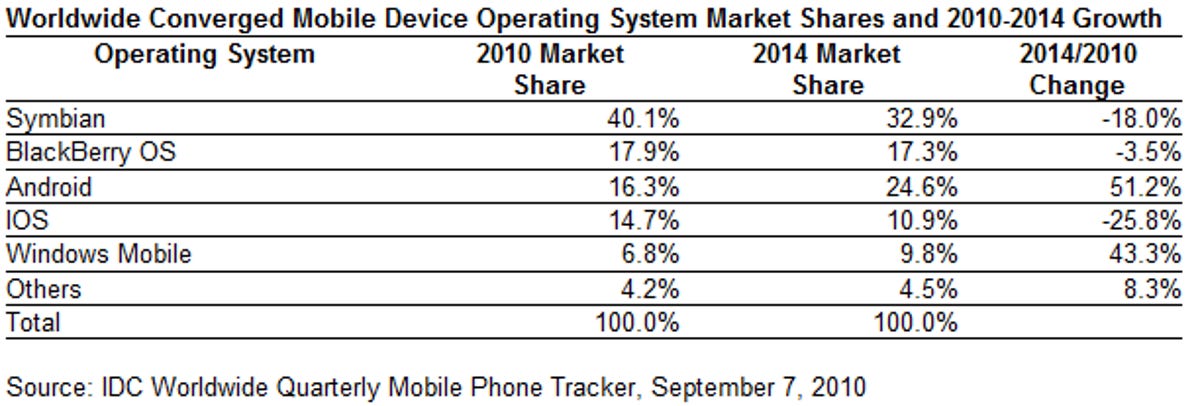The global smartphone market of 2014 could see Android in second place with a 25 percent share, followed by BlackBerry, Apple, and Windows Mobile, according to IDC’s new “Worldwide Quarterly Mobile Phone Tracker.”
Though annual growth in the hot smartphone market may slow in another four years, certain key players will continue to drive sales and grab more market share. No one vendor will dominate the landscape, but Android will enjoy the fastest growth, IDC forecasts.
Nokia’s Symbian will hang on to its No. 1 spot with 32.9 percent of the market in 2014. But it will lose some customers to Android, which will see its share climb from 16.3 percent this year to 24.6 percent.
“Phone vendors have been drawn to Android because it allows them to present their own approach to what a smartphone experience can be,” Ramon Llamas, a senior research analyst with IDC’s Mobile Devices Technology and Trends team, said in a statement. “In addition, users have quickly warmed to Android, comparing it to iOS due to its ease of use and a growing mobile application storefront. Now that HTC and Motorola have leapt out in front with their own respective devices, other vendors such as Dell, Kyocera, LG Electronics, and Samsung will soon help grow the Android market.”

IDC
BlackBerry‘s share will stay about the same, though Apple’s iOS is expected to lose some share, falling from 14.7% this year to 10.9% in 2014. Rounding up the top five, Microsoft will recapture some of its lost mobile market share through its new Windows Phone platform.
“IDC believes the market will comfortably support up to five OS players over the next five years,” Kevin Restivo, a senior research analyst with IDC, said in a statement. “Shorter replacement cycles and an ample feature phone to smartphone upgrade opportunity means the smartphone OS market will remain fragmented but healthy for the foreseeable future.”
Looking at the near term, consumer demand higher than expected should help the market grow 55.4 percent this year over 2009, 10 percent higher than IDC’s previous forecast last quarter. Amid launches of the iPhone 4, BlackBerry Torch, and HTC Evo 4G, 269.6 million smartphones will ship this year, compared with 173.5 million last year, estimates IDC.
The surge in demand will lead to overall growth of 14.1 percent this year, 1.5 percent higher than IDC’s prior forecast and a nice improvement over last year when the market dropped 2.8 percent. The smartphone market will enjoy further gains of 24.5 percent next year before declining to annual growth of 13.6 percent in 2014.
In a separate report earlier this week, Piper Jaffray was especially bullish on Android, saying it would likely control half of the smartphone market within five years.



